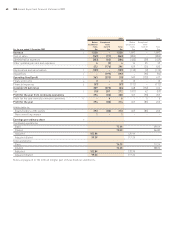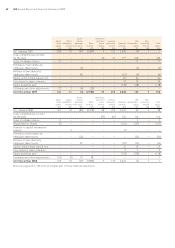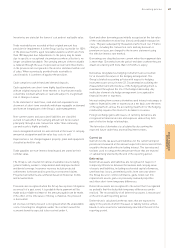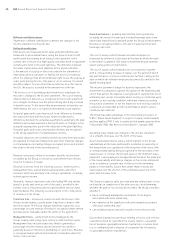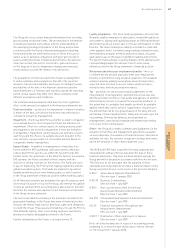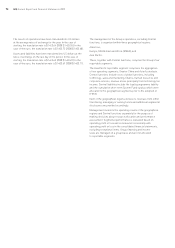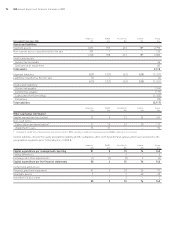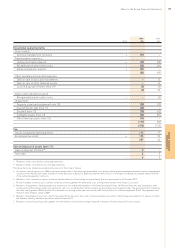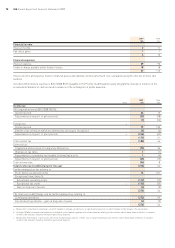Holiday Inn 2009 Annual Report Download - page 71
Download and view the complete annual report
Please find page 71 of the 2009 Holiday Inn annual report below. You can navigate through the pages in the report by either clicking on the pages listed below, or by using the keyword search tool below to find specific information within the annual report.
GROUP FINANCIAL
STATEMENTS
Accounting policies 69
Exceptional items
The Group discloses certain financial information both including
and excluding exceptional items. The presentation of information
excluding exceptional items allows a better understanding of
the underlying trading performance of the Group and provides
consistency with the Group’s internal management reporting.
Exceptional items are identified by virtue of either their size or
nature so as to facilitate comparison with prior periods and to
assess underlying trends in financial performance. Exceptional
items can include, but are not restricted to, gains and losses
on the disposal of assets, impairment charges and reversals,
restructuring costs and the release of tax provisions.
Use of accounting estimates and judgements
The preparation of financial statements requires management
to make estimates and assumptions that affect the reported
amounts of assets and liabilities, disclosure of contingent assets
and liabilities at the date of the financial statements and the
reported amounts of revenues and expenses during the reporting
period. Actual results may differ from these estimates under
different assumptions and conditions.
The estimates and assumptions that have the most significant
effect on the amounts recognised in the financial statements are:
Trade receivables – a provision for impairment of trade receivables
is made on the basis of historical experience and other factors
considered relevant by management.
Impairment – the Group determines whether goodwill is impaired
on an annual basis or more frequently if there are indicators of
impairment. Other non-current assets, including property, plant
and equipment, are tested for impairment if there are indicators
of impairment. Impairment testing requires an estimate of future
cash flows and the choice of a suitable discount rate and, in the
case of hotels, an assessment of recoverable amount based on
comparable market transactions.
System Funds – In addition to management or franchise fees,
hotels within the IHG system pay cash assessments which are
collected by IHG for specific use within the System Funds (the
Funds). Under the governance of the IAHI, the Owners’ Association,
IHG operates the Funds on behalf of hotel owners with the
objective of driving revenues for their hotels. The Funds are used
to pay for marketing, the Priority Club loyalty programme and the
global reservation system. The Funds are planned to operate at
breakeven with any short-term timing surplus or deficit carried
in the Group statement of financial position within working capital.
As all Fund assessments are designated for specific purposes and
do not result in a profit or loss for the Group, the revenue recognition
criteria as outlined in the accounting policy above are not met and
therefore the revenue and expenses of the Funds are not included
in the Group income statement.
The assets and liabilities relating to the Funds are included in the
appropriate headings in the Group statement of financial position
because the related legal, but not beneficial, rights and obligations
rest with the Group. These assets and liabilities include the Priority
Club Rewards liability, short-term timing surpluses and deficits
and any receivables and payables related to the Funds.
Further information on the Funds is included in note 33.
Loyalty programme – The hotel loyalty programme, Priority Club
Rewards, enables members to earn points, funded through hotel
assessments, during each qualifying stay at an IHG branded hotel
and redeem points at a later date for free accommodation or other
benefits. The future redemption liability is included in trade and
other payables and is estimated using eventual redemption rates
determined by actuarial methods and points values. Actuarial
gains and losses on the future redemption liability are borne by
the System Funds and any resulting changes in the liability would
correspondingly adjust the amount of short-term timing
differences held in the Group statement of financial position.
Retirement and other post-employment benefits – the cost
of defined benefit pension plans and other post-employment
benefits is determined using actuarial valuations. The actuarial
valuation involves making assumptions about discount rates,
expected rates of return on assets, future salary increases,
mortality rates and future pension increases.
Tax – provisions for tax accruals require judgements on the
interpretation of tax legislation, developments in tax case law
and the potential outcomes of tax audits and appeals. In addition,
deferred tax assets are recognised for unused tax attributes to
the extent that it is probable that taxable profit will be available
against which they can be utilised. Judgement is required as to
the amount that can be recognised based on the likely amount
and timing of future taxable profits, taking into account expected
tax planning. Deferred tax balances are dependent on
management’s expectations regarding the manner and timing
of recovery of the related assets.
Other – the Group also makes estimates and judgements in the
valuation of franchise and management agreements acquired
on asset disposals, the valuation of financial assets classified as
available-for-sale, the outcome of legal proceedings and claims
and in the valuation of share-based payment costs.
New standards and interpretations
The IASB and IFRIC have issued the following standards and
interpretations with an effective date after the date of these
financial statements. They have not been adopted early by the
Group and will be adopted in accordance with the effective date.
The Directors do not anticipate that the adoption of these
standards and interpretations will have a material impact on the
Group’s reported income or net assets in the period of adoption.
IFRS 2 Share-based Payment (Amendment)
Effective from 1 January 2010
IFRS 3R Business Combinations
Effective from 1 July 2009
IFRS 5 Non-current Assets Held for Sale and
Discontinued Operations (Amendment)
Effective from 1 July 2009
IAS 27R Consolidated and Separate Financial Statements
Effective from 1 July 2009
IAS 39 Financial Instruments: Recognition and
Measurement (Amendment)
Effective from 1 July 2009
IFRIC 17 Distribution of Non-cash Assets to Owners
Effective from 1 July 2009
Note: the effective dates are in respect of accounting periods
beginning on or after the date shown and so will be effective
for the Group from 1 January 2010.



